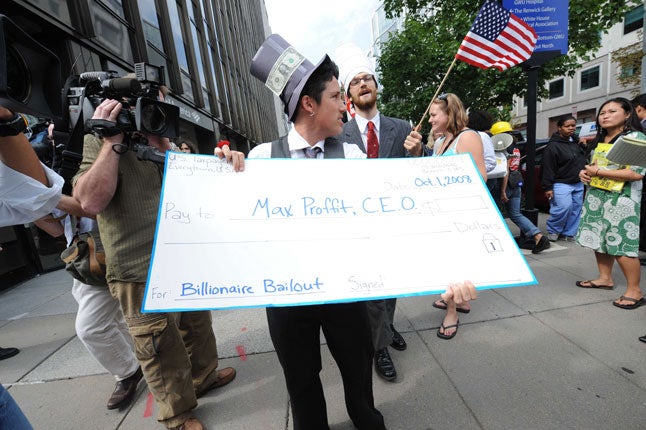Main Street grudgingly swings behind bailout
Plunge in share prices prompts change in mood. Sweetened bill expected to win approval in Senate

Under intense pressure from both presidential candidates, from business, industry and fearful ordinary voters, the US Senate was poised last night to give sweeping approval for the $700bn Wall Street rescue plan – an approval, it is hoped, that will push a recalcitrant House of Representatives into reversing its rejection of the measure before the end of the week.
The bill, whose stunning demise on Monday sent the Dow Jones index into its biggest-ever single-day points fall, has now been significantly sweetened by Congressional negotiators. The changes include an increase in the maximum federal insurance guarantee for bank deposits to $250,000 (£140,000) from the current $100,000, and various fiscal concessions for business and individual taxpayers.
Speaking on the campaign trail yesterday before they returned to Washington to take part in the Senate vote, both Barack Obama and John McCain pledged to back the bill, and avert a crisis of confidence that could wreck the US economy.
The financial debacle of the past few months had been "the final verdict on the failed philosophy" of the Republicans, said Mr Obama. But, he told a rally in the swing state of Wisconsin, "to Democrats and Republicans who have opposed this plan, I say this: 'Step up to the plate. Do what's right for the country, because the time to act is now.'"
Mr McCain delivered a message of similar urgency as he addressed supporters in Independence, Missouri. Joe Biden, Mr Obama's running mate, also interrupted his preparations for today's vice-presidential debate with his Republican opposite number Sarah Palin to cast his 'yes' vote on the Senate floor.
Though the bailout's passage in the Senate was assured, some doubts still persisted over its fate in the House. The boost in the bank deposit ceiling is being welcomed across the political spectrum. But the tax breaks – most of them extension of tax cuts for business that were about to expire – may upset as many Democrats who voted for the original measure as they win over Republicans who opposed it.
But one crucial ingredient in the mix has changed: the opinion of the man in the street. Before the first vote, calls by constituents to individual House members (all of them up for election in November) were overwhelmingly against the rescue, on the grounds it was an undeserved and unneeded bailout for Wall Street, whose greed had caused the crisis in the first place.
The result was that two-thirds of House Republicans defied the pleadings of George Bush and the Treasury Secretary, Henry Paulson, to vote against the measure, sending it to defeat by 228 votes to 205 – even though a majority of Democrats supported the legislation.
Now the mood has shifted 180 degrees, after the plunge in share prices prompted by the 'no' vote, and a realisation that a once-arcane breakdown in credit markets is starting to cause real pain on Main Street – the real world of production, jobs and local banks, from whom ordinary Americans borrow to finance everything from a new car to university education for their children.
"The tone has changed," said Charles Schumer, a senior Democrat on the Senate Banking Committee. "Last week, it was overwhelmingly 'Vote no'. But now it's, 'Well, you may not like this plan, but you've got to do something'." Voters, in other words, seem ready to punish their member if he casts a vote that risks deepening the financial crisis.
Other modifications to the bill include tax incentives for renewable energy, and an adjustment in the widely disliked Alternative Minimum Tax, originally conceived to make sure the very rich paid some tax on their incomes, but which – because of inflation – now affects middle-income-bracket taxpayers.
Regulators meanwhile are signalling readiness to ready to relax so-called "mark to market" accounting rules, and thus give banks more leeway in valuing their assets. That might help them shore up their balance sheets, and thus reassure investors.
It was unclear yesterday when the amended bill will go before the House, but the White House is urging a vote before the end of the week. "We're seeing increased evidence of the credit squeeze on small businesses and municipalities all across the country," said Mr Bush's spokesman. "It's really important we approve legislation this week and limit further damage to our economy."
The President however will have little influence on proceedings. Resentment of earlier and unfounded scare-mongering from the White House – on issues from non-existent WMDs in Iraq to unwarranted wiretapping to fight terrorists at home – contributed to Monday's revolt by Republicans who treated Mr Bush's dire warnings of financial collapse as more of the same. In a new Washington Post poll, his approval rating has sunk to an all-time low of 25 per cent, underlining how little clout he retains, barely three months before the end of his presidency.
Join our commenting forum
Join thought-provoking conversations, follow other Independent readers and see their replies
Comments